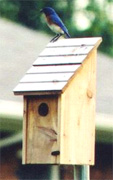This news item expired on Thursday, February 28, 2013 so the information below could be outdated or incorrect.
Don't miss the video link at the bottom of the page!
Lawns:
-
Think spring! This is the month for the spring application of slow-release fertilizer to the lawn.
-
If you have bare spots, late February or early March would be a good time to put down grass seed.
-
Check the condition of the lawn mower if not done in the fall. You could be needing it any day - so make sure it is tuned and sharpened before it’s too late.
 Ornamentals:
Ornamentals:
-
If overgrown shrubs need renovation, do severe pruning in late February or March.
-
Try forcing some blooming branches to brighten winter days. Look for swelling flower buds on winter honeysuckle, viburnums, winter daphne, spirea, forsythia, quince or fruit trees.
-
House plants could use some TLC by now. Take them to the sink or shower and give them a good bath. Cut back leggy stems and check for tiny insect pests.
-
Get outdoors. Winter days can bring wonderful surprises - crocus, early daffodils, hellebores, lungworts.
Fruits:
-
Prune grape vines. Sap will probably drip from cut stems during warm spells, but this is not harmful.
-
Check and repair trellises for grape vines and blackberries.
-
Mature apple and pear trees can be pruned, but do not prune young fruit trees, peaches or plums before March.
-
The Extension office has videos available for loan on pruning grape vines, brambles, blueberries and fruit trees - just call 255-5522 for more information.
Vegetables:
-
Start planning this year’s garden. Sketch the garden and fill in the rows for rotating crops and planning space.
-
Check last year’s notes. Which varieties performed well and which are not worth planting again? Start shopping for seeds at garden centers and seed catalogs.
-
Don’t let the calendar deter you from planting some vegetables. English and edible-pod peas, spinach, kale, onions and a few other cold hardy crops can be planted beginning in late February, and on through March.
Other:
-
Clean out bird houses and put up new ones. Bluebirds and some other songbirds start scouting for spring nest boxes in February.
-
Plan ahead for seed starting needs. Check your supply of containers, potting media, supplemental lighting, and of course seeds.
For more information, view BCTV's February Garden Chores video with host Linda Blue, or call Buncombe County Cooperative Extension at 255-5522.